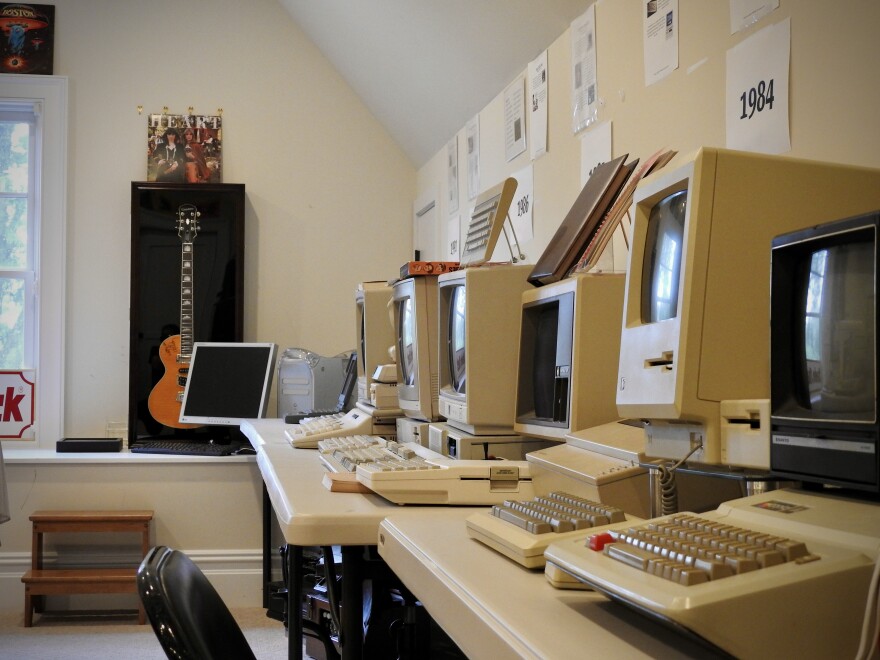Eighteen-year-old Jay Babina spends hours on end each week focused on technology. But he’s not scrolling on social media; most of the time, he’s not even using a smartphone. Instead, he’s downloading a new program onto the first-ever Mac computer or wiring two Alexander Graham Bell-style telephones together.
That work goes toward what Babina calls the Westport Tech Museum, where he amassed more than 400 pieces of technology that he’s researched, curated and displayed in his attic in Westport, Conn.
“I feel like I'm preserving important things in history that would usually get thrown away, trashed,” he said, glancing over cameras, video games, watches, telephones and other gadgets that fill the spacious top floor.
“I'm keeping it safe and showing people the evolution of tech and history. And that's important.”

Babina began his collection at 14 years old after he found a second-generation iPod from 2002 in the glovebox of his parent's car. Rooting around his basement, he found some other older cell phones and started to set up small displays in his room. The museum grew from there through donations, flea market deals, and countless eBay searches.
Much of the history Babina has captured with his collection preserves his own family’s narrative. One of the first items on display after climbing carpeted attic stairs is the exact radio his family used to learn about the attack on Pearl Harbor more than 80 years ago, through which Babina plays a crackly yet distinct clip of former President Franklin Roosevelt’s speech to museum guests.
“It takes a minute to warm up because it's, you know, 85 years old,” said Babina, fiddling with dials on the hulking radio. “It was an old family story. My great-grandfather told my grandfather, who told me.”
On a computer-filled countertop lining the back wall, Babina keeps his dad’s Commodore 64, an 8-bit “home computer” he said his dad learned to program on.
“It's great to be able to pass it on down to him,” said John Babina. “Sometimes I wish I kept even more things from the past, you know? If I had known that he was going to have this interest level, I would have kept a lot more things.”

The vast majority of items in the collection are far older than Babina, who was born a mere year before the release of the first iPhone. He said he gains a nostalgia for the devices just by watching others interact with technology from decades past.
“I like seeing other people feeling nostalgia when they see this stuff,” he said, gesturing to the gray box with an attached bulky keyboard that makes up his father’s programming computer. “When they come up and they're like, “Oh, I had that when I was a kid! I remember programming on the Commodore 64, I remember typing on a Mac or playing with the rotary phone dials.” I just like seeing that.”
Though the space isn’t open to the public, it still gets its fair share of visitors: friends-of-friends or party guests who, according to Babina, tend to be older. As a self-labeled ‘old soul,’ Babina said he treats those visits as a chance to make references that he knows will garner a response.
Stopping in front of an imposing box with dials and buttons galore, Babina explains that it’s a Sony Reel-to-Reel player — the exact model former President Richard Nixon used to record conversations during the Watergate scandal.

“And I have a joke,” he chuckled. “Everyone always asks me, 'What's on the tape?' I say that's the missing 18 and a half minutes from Watergate. And everyone's always that age, that they know what I'm talking about… They think it’s hilarious.”
Babina’s preference for generations-old technology and music from the 80s makes for an incredibly detailed museum, but has led to some difficulties connecting to others his age.
“I have a lot of friends, but it's just harder for me to, you know, talk with them,” he said. “Then you find that there's one person — you make your ‘867-5309’ joke — and if they're like, 'Oh, I know what you're talking about,' and I'm like, 'Yeah, you know Tommy Tutone!'"
Despite his taste for older tech, Babina doesn’t turn his nose up at using today’s devices, nor does he think his generation has a relationship with technology — specifically, social media — that’s much different from previous generations.
“I feel like a lot of the video game systems were probably used the same way… It's always been that way since maybe the late 70s, [with] personal computers and video games, cameras,” he said. “Everyone's always addicted to something. I don't think it's really different today than it was back then.”
Babina leaves for college at the end of the summer. Though it isn’t far from Westport, he knows he won’t be home as often to work with his collection. So for the first time, he’s looking to move part of his technology museum to the public.
But even if he’s not in the attic, Babina wants to keep collecting — for the memories, even if they’re not his own.








